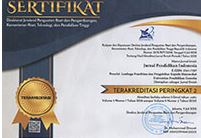DIMENSI BIG FIVE PERSONALITY DAN PSYCHOLOGICAL WELL-BEING MAHASISWA RANTAU ASAL DAERAH 3T
Keywords:
Big Five Personality, Psychological Well-Being, Students 3TAbstract
Indonesia has 62 territory of the frontier, Outermost, and lagging (3T) where the area is located far from urban areas and scattered throughout the territory of Indonesia. It makes students have to go, where regional students described as someone who continue their education in other areas, which is caused by uneven system of higher education. As a student overseas, certainly many of the challenges faced by the start of differences in language and culture, so the importance of forming a good personality in achieving psychological well-being. Therefore, this study aims to determine the contribution of dimensions of big five personality on psychological well-being of regional students derived from 3T. The method used is quantitative with the design of the simple regression. Participants in this study were 53 regional students derived from the 3T in Satya Wacana Christian University with a snowball sampling technique. The measurement of research using the scale of big five personality and the scale of psychological well-being. Based on the results of the t test obtained the dimensions of extraversion, openness to experience and conscientiousness of the variables of the big five personality has an influence on psychological well-being, with a significance less than 0.05. While on the dimensions of neuroticism and agreeableness have no contribution to psychological well-being
References
Abdullahi, A. M., Orji, R., Rabiu, A. M., & Kawu, A. A. (2020). Personality and subjective well-being: Towards personalized persuasive interventions for health and well-being. Online Journal of Public Health Informatics, 12(1), e1. doi:10.5210/ojphi.v12i1.10335.
Adyani, L., Suzanna, E., Safuwan, & Muryali. (2019). Perceived social support and psychological among interstate students at malikussaleh university well-being scholl bullying behavior among elementary students East Bandung Region. Jurnal Indigenous, 3(2), 98-104. https://doi.org/10.23917/indigenous.v3i2.6591.
Ahadiyanto, N. (2020). Hubungan dimensi kepribadian the big five personality dengan tingkat kesejahteraan psikologis narapidana. Jurnal Al-Hikmah, 18(1), 117-130. https://doi.org/10.35719/alhikmah.v18i1.26
Akhrani, L. A., Alhad, M. A., Najib, A., Almira, H., Dewi, C. F., Maulida, S. A., & Yolanda, C. (2020). Hallo traveler, how happy are you? psychological well-being traveler ditinjau dari big-five personality dan traveling type. Jurnal Ilmiah Psikologi Terapan, 8(2), 160-176. https://doi.org/10.22219/jipt.v8i2.11281.
Dacosta, L. P. E. (2015). Hubungan antara trait big five personality dengan psychological well-being pada siswa Seminari Menengah St. Petrus Canisius Mertoyudan Magelang. Tugas Akhir (tidak diterbitkan). Salatiga: Universitas Kristen Satya Wacana
Diranti, P. (2017). Psychological well-being ditinjau dari big five personality pada mahasiswa. Skripsi (tidak dipublikasikan). Yogyakarta: Universitas Gadjah Mada.
Fadhil, A. (2021). Evaluasi properti psikometris skala psychological well-being (PWB) versi Indonesia. Jurnal Pendidikan Tambusai, 5, 4666-4674.
Fitroni, M. A., & Supriyanto, A. (2020). Permasalahan yang dihadapi mahasiswa baru dalam menjalani kehidupan di Universitas Negeri Nalang. Seminar Nasional Arah Manajemen Sekolah Pada Masa dan Pasca Pandemi COVID-19, 170-179. http://conference.um.ac.id/index.php/apfip/article/view/407.
Freire, C., Ferradás, M. D., Valle, A., Núñez, J. C., & Vallejo, G. (2016). Profiles of psychological well-being and coping strategies among university students. Frontiers in Psychology, 7, 1554. https://doi.org/10.3389/fpsyg.2016.01554.
Halim, C. F., & Dariyo, A. (2016). Hubungan psychological well-being dengan loneliness pada mahasiswa yang merantau. Jurnal Psikogenesis, 4(2), 170-181. https://doi.org/10.24854/jps.v4i2.344.
Hicks, R. E., & Mehta, Y. P. (2018). The big five, type a personality, and psychological well-being. International Journal of Psychological Studies, 10(1), 49-58. http://doi.org/10.5539/ijps.v10n1p49.
Huppert, F. A. (2009). Psychological well-being: Evidence regarding its causes and consequences. Applied Psychology: Health and Well-Being, 1(2), 137-164. https://doi.org/10.1111/j.1758-0854.2009.01008.
Indrawati, T. (2017). Peranan kecerdasan emosi dan dukungan sosial terhadap kesejahteraan psikologis siswa SMP terbuka di Cirebon. Edukasia Islamika: Jurnal Pendidikan Islam, 2(1), 70-88. https://doi.org/10.28918/jei.v2i1.1630.
John, O. P. (1990). History, measurement, and conceptual elaboration of the big five trait taxonomy (4th ed). In handbook of personality: Theory and research. New York: Guilford Press.
Kurniasari, E., Rusmana, N., & Budiman, N. (2019). Gambaran umum kesejahteraan psikologis mahasiswa. Journal of Innovative Counseling: Theory, Practice, and Research, 3(2), 52-58.
Landa, J. M. A., Martos, M. P., & López-Zafra, E. (2010). Emotional intelligence and personality traits as predictors of psychological well-being in Spanish undergraduates. Social Behavior and Personality, 38(6), 783–794. https://doi.org/10.2224/sbp.2010.38.6.783
Larasati, R., Nugrahawati, E. N., & Sartika, S. (2019). Hubungan antara tipe kepribadian dengan psychological well-being pada remaja dari orang tua bercerai di Kota Bandung. Prosiding Psikologi, 5(2), 944-949.
Mehta, Y., & Hicks, R. (2018). The big five, mindfulness, and psychological well-being. GSTF Journal of Psychology (Jpsych), 4(1), 1-7. doi: 10.5176/2345-7929_4.1.103.
Mobarakeh, M. R. V., Juhari, R., Yaacob, S. N., Redzuan, M., & Mobarakeh, S. I. (2015). The effects of personality traits and psychological well-being among Iranian adolescent migrants in Kuala-Lumpur, Malaysia. IOSR Journal of Humanities and Social Science (IOSR-JHSS), 7(1), 25-28. doi:10.9790/0837-20712528.
Mustafa, M. B., Rani, N. H. M., Bistaman, M. N., Salim, S. S. S., Ahmad, A., Zakaria, N. H., & Safian, N. A. A. (2020). The relationship between psychological well-being and university students academic achievement. International Journal of Academic Research in Business and Social Science, 10(7), 518-525.
Nel, K., Govender, S., & Tom, R. (2016). The social and academic adjustment experiences of first-years students at a historically disadvantaged peri-urban university in South Africa. Journal of Psychology in Africa, 26(4), 384-389. http:dx.doi.org/10.1080/14330237.2016.1208960.
Olivo, G., Gour, S., & Schiöth, H. B. (2019). Low neuroticism and cognitive performance are differently associated to overweight and obesity: A cross-sectional and longitudinal UK biobank study. Psychoneuroendocrinology, 101, 167-174. https://doi.org/10.1016/j.psyneuen.2018.11.014.
Oravecz, Z., Dirsmith, J., Heshmati, S., Vandekerckhove, J., & Brick, T. R. (2020). Psychological well-being and personality traits are associated with experiencing love in everyday life. Personality and Individual Differences, 153, 109620. https://doi.org/10.1016/j.paid.2019.109620.
Presiden Republik Indonesia. (2020). Peraturan Presiden Republik Indonesia No. 63 Tahun 2020 tentang penetapan daerah tertinggal tahun 2020-2024. Kementerian Sekretariat Negara, 018390, 1-8. https://jdih.setkab.go.id/PUUdoc/176108/Perpres_No_63_Tahun_2020.pdf.
Qadeer, T., Javed, M. K., Manzoor, A., Wu, M., & Zaman, S. I. (2021). The experience of international students and instituonal recommendations: A comparison between the students from the developing and develop regions. Frontiers in Psychology, 12, 667230. doi:10.3389/psyg.2021.667230.
Rachmayani, D., & Ramdhani, N. (2014). Adaptasi bahasa dan budaya skala psychological well-being. Proceding: Seminar Nasional Fakultas Psikologi, Universitas Muhammadiyah Surakarta, 253-268.
Rahmadi, I. F. (2020). Pendidikan di daerah kepulauan terpencil: Potret siswa, guru, dan sumber belajar. Jurnal Pendidikan Edutama, 7(1), 75-84. https://doi.org/10.30734/jpe.v7i1.756.
Rahmah, I. A. D. A. & Lisnawati, L. (2019). Kesejahteraan psikologis ditinjau dari spiritualitas siswa di lembaga pendidikan berbasis agama pesantren dan non pesantren. Jurnal Psikologi Integratif, 6(2), 190-212. https://doi.org/10.14421/jpsi.v6i2.1499.
Ramdhani, N. (2012). Adaptasi bahasa dan budaya inventori big five. Jurnal Psikologi, 39(2), 189-207. doi:10.22146/jpsi.6986.
Revelia, M. (2016). Pengaruh big five personality dan adversity quotient terhadap psychological well-being santri pondok pesantren darul muttaqien. TAZKIYA: Journal of Psychology, 4(2), 4-16. https://doi.org/10.15408/tazkiya.v4i2.10836.
Rüppel, F., Liersch, S., & Walter, U. (2015). The influence of psychological well-being on academic success. Journal Public Health, 23, 15-24. Doi:10.1007/s10389-015-0654-y.
Ryff, C. D. (2014). Psychological well-being revisited: Advances in the science and practice of eudaimonia. Psychotherapy and Psychosomatics, 83(1), 10–28. https://doi.org/10.1159/000353263
Ryff, C. D. (1989). Happiness is everything, or is it? Explorations on the meaning of psychological well-being. Journal of Personality and Social Psychology, 57(6), 1069-1081. https://doi.org/10.1037/0022-3514.57.6.1069
Salami, S. O. (2011). Personality and psychological well-being of adolescents: The moderating role of emotional intelligence. Social Behavior and Personality, 39(6), 785-794. https://doi.org/10.2224/sbp.2011.39.6.785.
Soewastika, A., W., Safitri, C., B., & Anindya, F. (2019). Hubungan kepribadian mahasiswa dengan kesejahteraan psikologis dari berbagai Universitas di Indonesia. ResearchGate. https://www.researchgate.net/publication/337888758
Sudirmanto, S. (2019). Perilaku mahasiswa rantau di Pekanbaru (studi kasus mahasiswa pelalawan). JOM FISIP. 6(2), 1-12.
Supriyadi, S., Saifudin, I. M. M. Y., & Hartono, B. (2020). Faktor-faktor yang berhubungan dengan psychological well-being remaja SMP Negeri 1 Banguntapan Bantul Yogyakarta. Jurnal Perawat Indonesia, 4(3), 437-445. https://doi.org/10.32584/jpi.v4i3.635.
Udhayakumar, P., & Illango, P. (2017). Psychological wellbeing among college students. Journal of Social Work Education and Practice 3(2) 79-89.
Wijanarko, E., & Syafiq, M. (2013). Studi fenomenologi pengalaman penyesuaian diri mahasiswa Papua di Surabaya. Jurnal Psikologi Teori dan Terapan, 3(2), 79-92. https://doi.org/10.26740/jptt.v3n2.p79-92.
Winefield, H. R., Gill, T. K., Taylor, A. W., & Pilkington, R. M. (2012). Psychological well-being and psychological distress: Is it necessary to measure both?. Psychology of Well-Being: Theory, Research and Practice, 2(1), 1-14.










